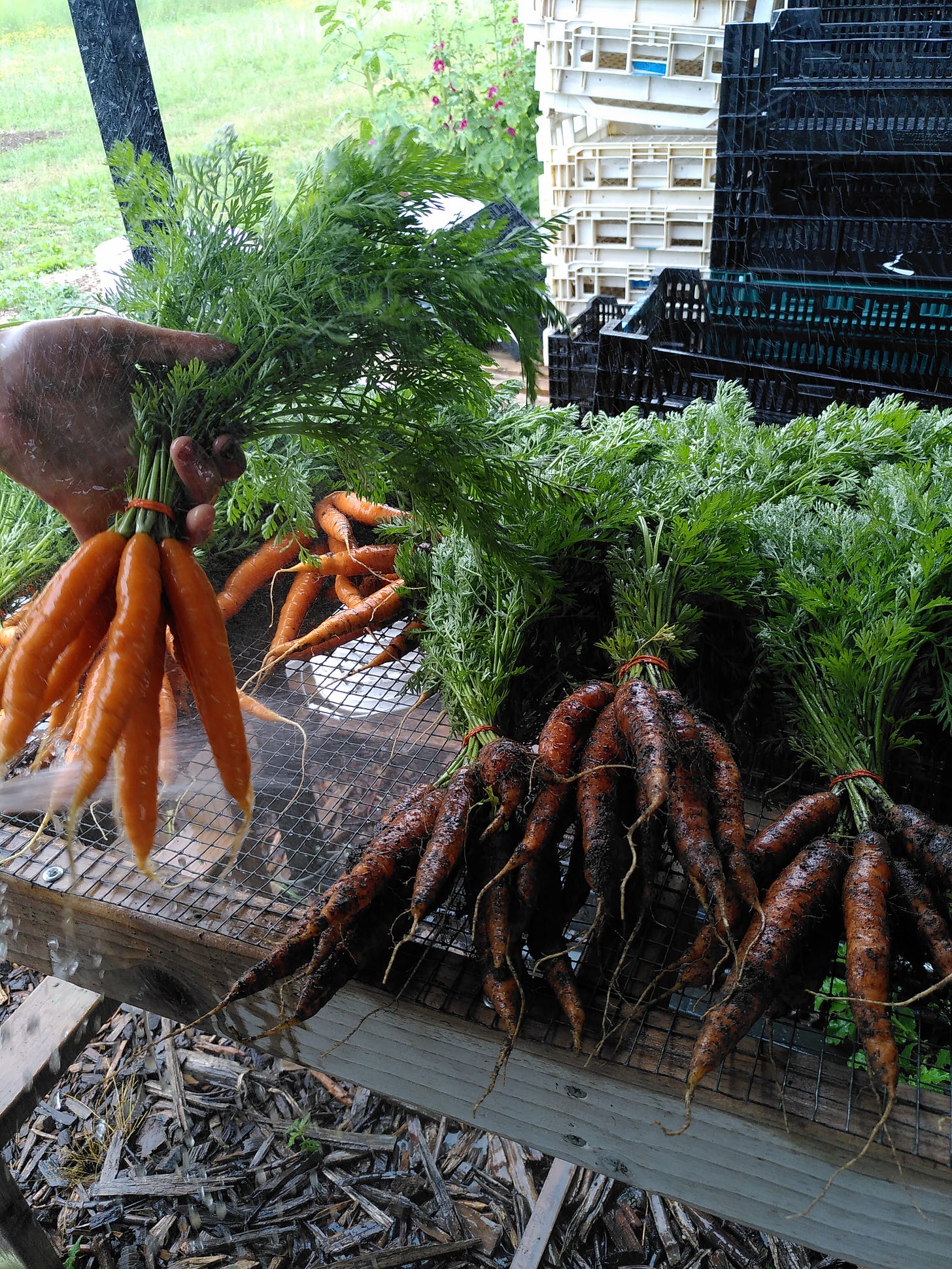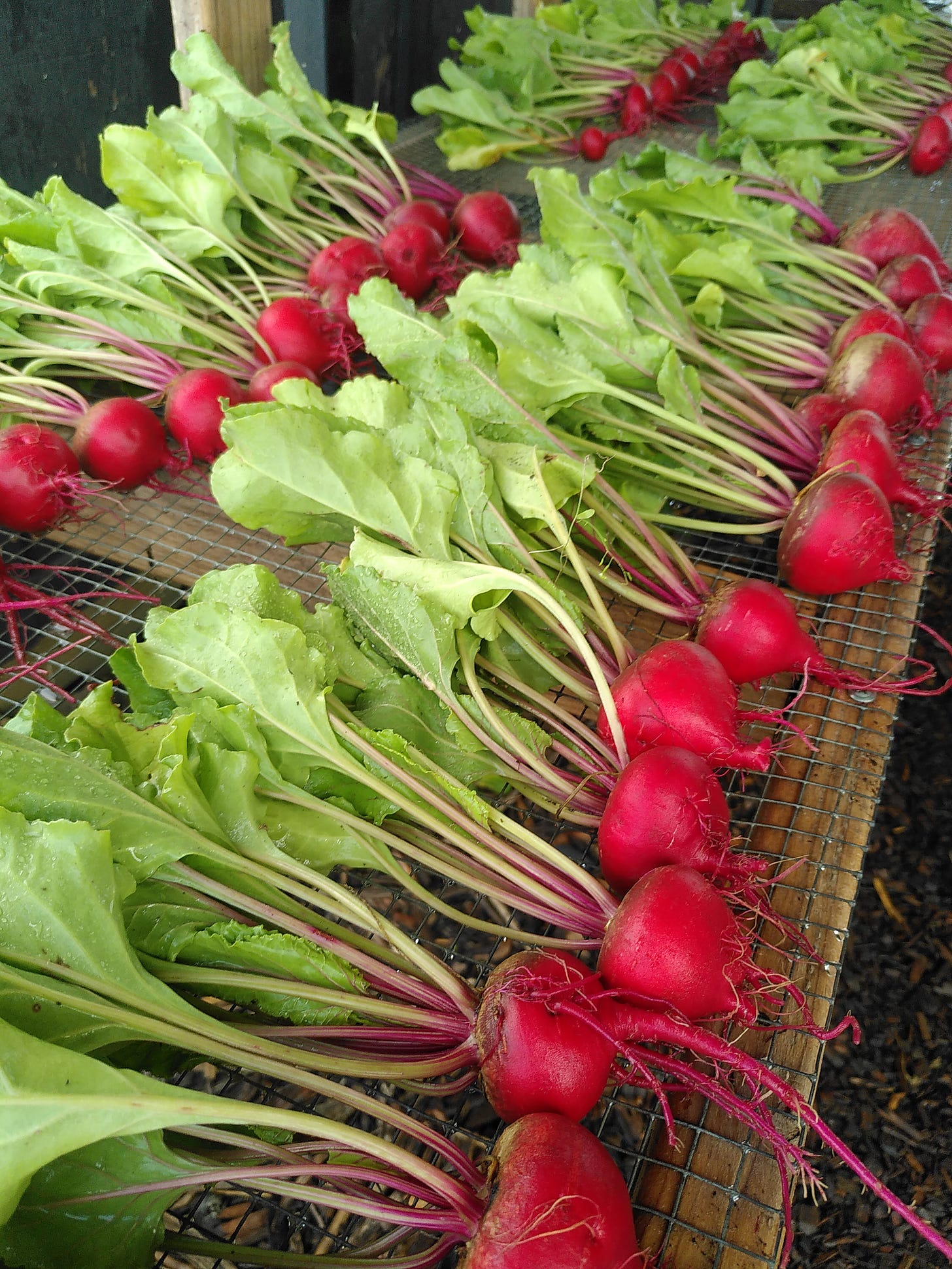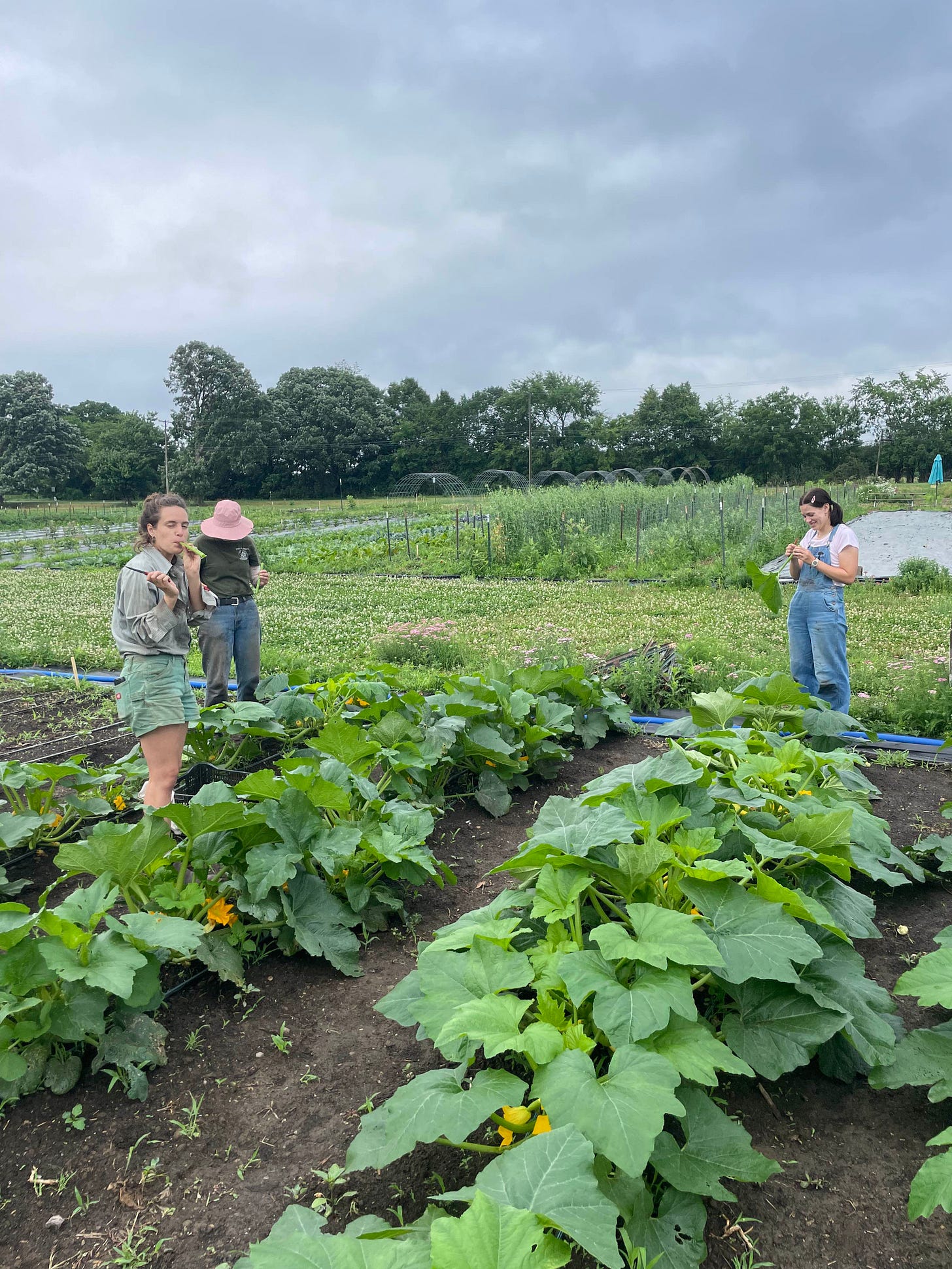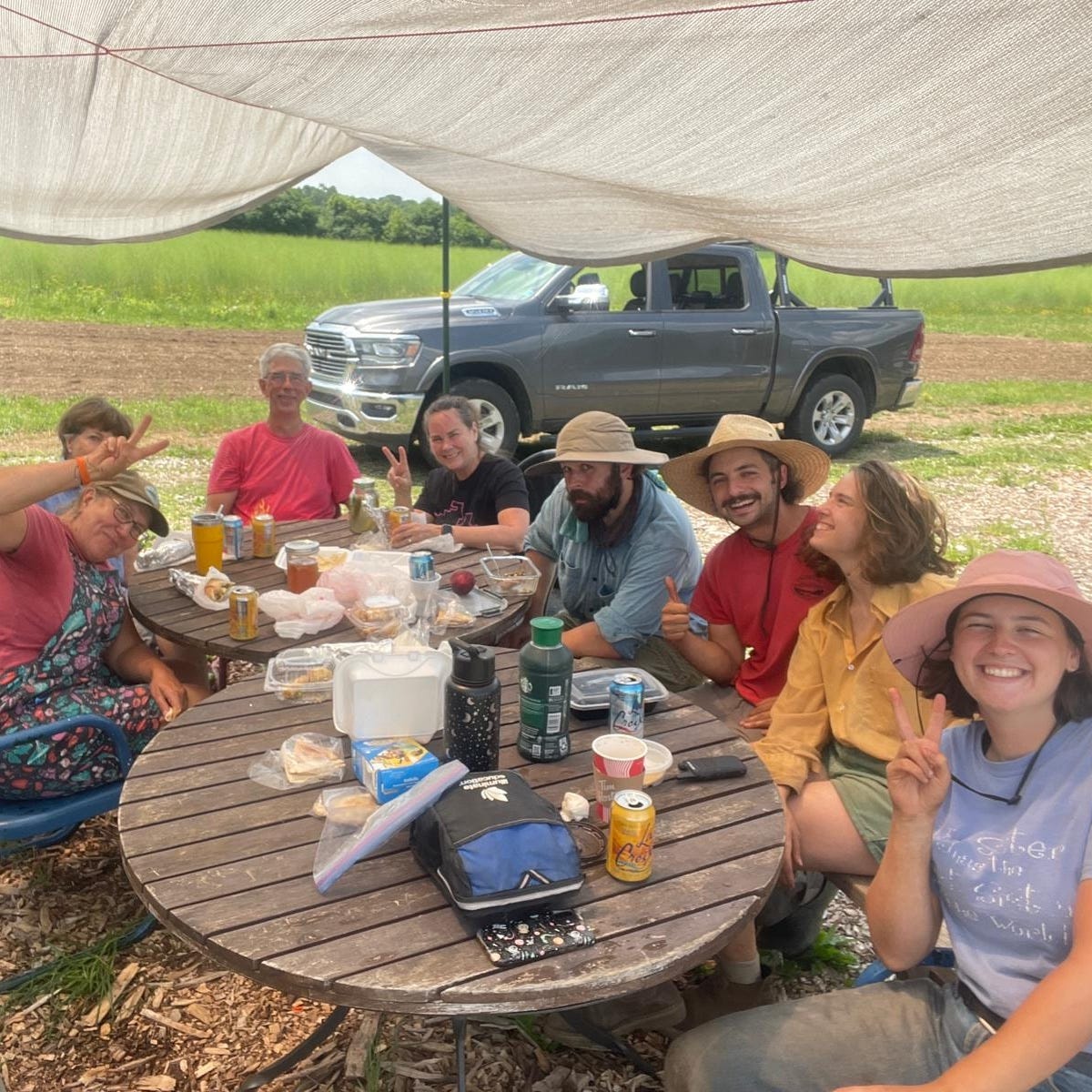Hi y’all,
Welcome back to Scrap Kitchen the newsletter/podcast where I chat to you about my endeavours to run a farm, start a farm and stay sane in the process.
You may have noticed, eagle-eyed followers, that it has been nearly 3 weeks since my last update. If you haven’t noticed, or you’re new here, welcome. And now you know. My reasons for this absence are multiple and various; the heat, an anniversary, big projects and more heat.
Last Monday my partner and I (with whom I am running the current farm, and am trying to start our own farm) celebrated our three-year anniversary. One of the volunteers on the farm shared some advice with us that her neighbour told her.
Birthdays will happen no matter what you do, but anniversaries you have to work for. Celebrate accordingly.
So we did.
We took the bus into Detroit (gotta love a public transport system that works), we stayed in an old hotel, walked our way around in 40°C heat, scooted to the newly refurbished station and capped the night off with one of the best meals of my life (and a pumping wine bar on a Monday night). It was wonderful. It was glorious.
Having time off is glorious. Having time off with this dude that I love so dearly is even better.
So that was one reason.
The other main reason is the 35°C days all last week, the pressing, cloying heat snatching any motivation that dared to exist outside of essential tasks. We rose before the sun, at about 5:40, in work for 7, harvest, cull cucumber beetles, trellis, trim, and tap out at 2 pm when the heat becomes unbearable.
We’re not alone in this. Between this last May and this one 6.3 billion people experienced a month or more of abnormally high temperatures.
Yes, of course, it made me climate anxious. At the front of my mind was the heat India has been facing. The wet-bulb temps. The 50°C streaks on the map, a black colour denoting the blistering heat, so hot it surpasses red. Like the bitter coals of a fire. And it’s worse than that, worse than an infographic, or stylised map. There are people in Mungeshpur and Rajasthan feeling that. Living in that. There are people not surviving it.
Part of the brutality of the climate crisis is that the countries least responsible are bearing the brunt. Those along the equator, living in increasingly uninhabitable conditions, faring the worst. While those in the global north, whose “industry” and imperialism caused this catastrophe get more manageable effects. A reduced sentence. Injustice abound.
This is not to say that the heat here was any less dangerous. That the baking concrete of Detroit didn’t serve to highlight how cities become hot houses and those redlined and underprivileged (purposefully so) will fare the worst. Injustice nestles itself between tree-free streets and in undrinkable water.
When you’re in the middle of a field, the sun beaming down, when the shade is still stifling and you realise you are drenched in sweat, it’s hard to look outwards. To not be in the animal husk of your body, to be present. But at the same time it is so easy to feel the looming heat. The locking in of 1.5°C of warming. At best. At best!
And we are lucky enough to be able to leave. To prioritise the wellness of the team. The exploited migrant workforce certainly does not get to call it quits in this temperature. Our farm isn’t like that but it is also not the norm for this country.
All this to say, farm workers are on the front lines of the climate crisis.
And I recognise every day that I am one of the privileged ones.
Current Farm Updates
As my beloved has been saying “It’s wonderful weather for plants. Terrible for humans.”
We have been seeing a flush of all our summer fruits, bursting into dark-green being.
The tomatoes are days away from their first fruit. The plant that will produce it was grown from last year’s seed and has been earmarked for seed saving again this year. Just another reminder of the power of seed, of selecting and breeding crops that grow well in your conditions. That in growing them (indeed of storing seeding in some bank, where it has no chance to adapt), we are stabilising the varieties against an ever-changing climate.
So Tomatoes are on the horizon.
As are peppers, cucumbers, dahlias, cabbage and more.
This year we spent the winter planning out the crops with the intention of fulfilling more wholesale orders. Like everything else, wholesale has its upsides and downsides. On the upside, you can make a good chunk of change from selling 300 bunches of green onions. Not only that but having an outlet or two that can take a vast quantity of produce is good for not letting what you grow go to waste. Conversely, there is a drop in price that you can ask for when it comes to wholesale, the quantity necessitates a discount. It might be a large sum of money but you’re getting less per unit. Ah, choices choices.
Anyways at the start of this year, we decided to prioritise wholesale orders. There are two large CSAs (veg box schemes) in the area, with 250 and 370 shares apiece. Our aim was to grow enough to be able to deliver one large order once per week of either green onions, Asian greens or kale/chard. We based our crop plan around this.
Mostly we have been able to stick to the plan, with a good-sized order heading out each week. But there have been hiccoughs. The heat has caused the Asian greens to bolt (start producing flowers) so they had to be harvested earlier than expected, thus reducing our yield. The chard was absolutely ravaged by Deer, not once but thrice. And that’s not taking into account the market. There are other local farms also supplying these schemes, they might already have a supply for Asian greens that week, or kale, or whatever.
Where I’m going with all this is that we are on track for our plans but the weather is as fickle as the market. Just another of the realities that farms and small businesses must deal with. Another choice to make.
On a lighter note, the strawberries we planted this spring are producing berries. The intense heat and evening-break thunderstorms have agreed with them. We are still open for U-Pick which is a great way to connect with the local community.
Not only that but we managed to plant our field of winter squash. All 5 acres of it. By hand. In the rain.
It was actually a wonderful drizzle that was very cooling. And the fresh tilled field (one of the only places we do till on the farm) was a pleasure to walk in bare foot. To measure out 1.5m in steps and place carefully two fat little seeds into the waiting earth. A good way to spend a morning. And now their round cotyledons (first leaves) are popping out of the dirt. Next will come the weeding, then the unruly tangle of vines.
The planting of the winter squash field, which will be U-Pick Pumpkins and squash come autumn, was our last big project of the season. We had the tour of 750 people (a hectic but fun day), we planted all our high-value crops (tomatoes, peppers, aubergine etc), we survived asparagus season ( no more 7-day weeks). So here we are, out the other side. Ready to reap the rewards of several months of work.
From now on our weeks fall into a predictable pattern. As comforting as the sound of train wheels or the consistent patter of rain at night.
Wednesday, harvest. Thursday, trim and trellis our tomatoes and cucumbers. Friday, Harvest. Saturday, sell at the farmstand, coordinate volunteers for big tasks and distribute our CSA. Sunday, harvest wholesale orders.
It’s doable. It’s rewarding. It’s time to ease into the rest of the year.
Future Farm Updates
With more time on our hands (finally) we have been able to get back to the business of finding land. We’ve reached out for information on serval sites offered by the South West Land Match and are currently researching each one to find potential clients/partners/businesses within each area.
It’s pretty exciting to imagine all the possibilities these spaces hold. To try to picture what life you might lead there, who you might work with and how you might feel. Then to think critically, business-ly about how you might make that life. What you need to get ready, to get good at.
We are also weeks away from submitting the Visa application (just waiting on an updated passport).
Everything is both coming together and up in the air all at once. It’s a time of great potential and lots of spreadsheets.
Hopefully, soon we will be able to submit our plans for review by the landowners and get into conversation about how we might work together. And when we do I will keep you updated.
For now, we shall sit in the fertile moment of unending possibility.
For now, we will enjoy the manageable 27°C rainy day.
Later,
M
Find me on Instagram, The Dots and my Website.
To support my work, please consider buying me a Coffee.
If you missed the last update, read it here.




















Share this post